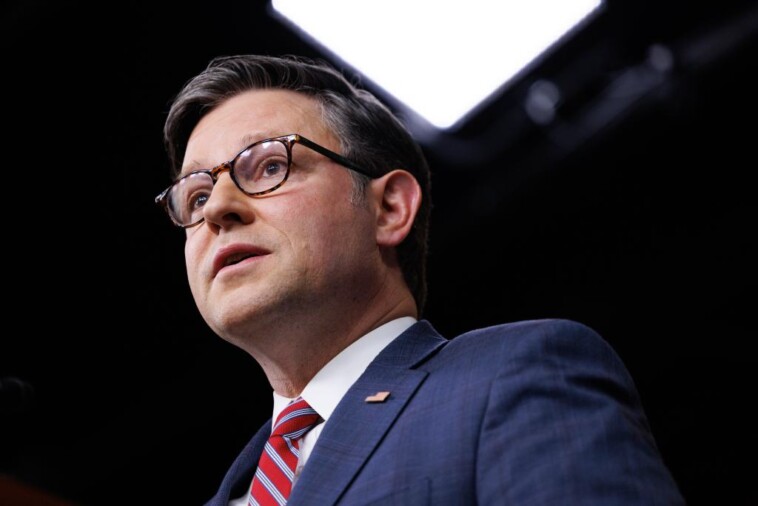WASHINGTON — House Speaker Mike Johnson knocked “Comrade Kamala” Harris on Tuesday for touting “centralized price controls” and trillions in new government spending as part of her economic agenda — suggesting the plan sounded like something Oprah Winfrey would come up with.
At an America First Policy Institute forum in Washington, D.C., Johnson (R-La.) pledged to reverse the “big government socialist experiment” that President Biden and Vice President Harris presided over the past four years.
“Candidate ‘Comrade Kamala’ Harris — as President Trump is known to call her — now wants to take it to a whole different level,” the House speaker said.
“If you follow her around on her little campaign speeches, all she’s talking about is more centralized price controls and new government spending programs.”
“And everybody gets a car,” he joked. “It’s like Oprah’s running for president.”
Johnson also sat for a fireside chat with former Trump National Economic Council Director Larry Kudlow, who lashed out at many of Harris’ recent economic proposals.
Her plans would cost more than $1.7 trillion, economists have estimated, and include up to $50,000 in tax deductions for new small businesses, $25,000 in handouts for first-time homeowners and $6,000 in tax breaks for lower and middle-income families who have a child aged one or younger.
Johnson went on to rattle off a “very aggressive” list of counter-objectives for Republicans’ first 100 days if they win a unified government in November — with a primary focus on “extending and building upon” the 2017 Tax Cuts and Jobs Act, which expires at the end of 2025.
“We’ll keep those cuts in place to support job creation, along with the doubled guaranteed deduction and a strong child tax credit,” he promised.
“But unlike the Democrats’ proposal, we will ensure that our tax policy respects the dignity of work and does not pay people more for staying out of the workforce.”
Johnson also insisted that “gone are the days of allowing China to steal our jobs, exploit our trade deals, and hollow out our manufacturing sector.”
“It’s obviously not in our national interest to rely on Communists for our energy, critical minerals, and pharmaceuticals. And we know it’s not in our national interest to support the economy of our largest geopolitical adversary,” the house speaker said.
The GOP lawmaker noted that the stake of the 2024 election involves China after Harris proposed a 28% corporate tax rate, which he said would be “at least 30% higher than any other Chinese competitors.”
He also faulted the Harris-Biden administration for hampering US oil and gas production and wastefully spending on renewable alternatives via the 2022 Inflation Reduction Act, which he said was “costing twice as much as it was advertised and is sending our taxpayer dollars to China.”
A high school drama kid, Johnson couldn’t help but warm up the crowd a bit with a Trump impression.
“Nobody talk about energy independence,” the former president told House Republicans at a Capitol Hill breakfast in June, Johnson recounted. “Dominance — dominance.”
Those efforts could happen in concert with a clawback of some Harris-Biden spending programs and a new government efficiency commission, proposed by billionaire entrepreneur Elon Musk and backed by Trump, to complete a federal audit of all financial waste, fraud and abuse.
Johnson was bullish about the plan.
“President Trump wants to take a blow torch to the regulatory state — and I want to help him hold it,” the House speaker told attendees.
At the same time as the forum, however, the 45th president was posting on his Truth Social the State and Local Tax (SALT) deduction that he authorized as part of his signature 2017 law, which according to the Committee for a Responsible Federal Budget would increase the cost of a revamped tax law by $1.2 trillion.
“I will turn it around, get SALT back, lower your Taxes, and so much more,” Trump pledged. “I’ll work with the Democrat Governor and Mayor, and make sure the funding is there to bring New York State back to levels it hasn’t seen for 50 years.”
The price tag would further complicate Republican efforts to lower spending.





